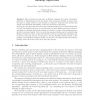Free Online Productivity Tools
i2Speak
i2Symbol
i2OCR
iTex2Img
iWeb2Print
iWeb2Shot
i2Type
iPdf2Split
iPdf2Merge
i2Bopomofo
i2Arabic
i2Style
i2Image
i2PDF
iLatex2Rtf
Sci2ools
152
Voted
ECML
2007
Springer
2007
Springer
Sequence Labeling with Reinforcement Learning and Ranking Algorithms
Many problems in areas such as Natural Language Processing, Information Retrieval, or Bioinformatic involve the generic task of sequence labeling. In many cases, the aim is to assign a label to each element in a sequence. Until now, this problem has mainly been addressed with Markov models and Dynamic Programming. We propose a new approach where the sequence labeling task is seen as a sequential decision process. This method is shown to be very fast with good gene ralization accuracy. Instead of searching for a globally optimal label sequence, we learn to construct this optimal sequence directly in a greedy fashion. First, we show that sequence labeling can be modelled using Markov Decision Processes, so that several Reinfo rcement Learning (RL) algorithms can be used for this task. Second, we introduce a new RL algorithm which is based on the ranking of local labeling decisions. Finally, we introduce an original method for sequence labeling, where labels are decided in an order-free m...
ECML 2007 | Machine Learning | Optimal Label Sequence | Sequence Labeling | Sequence Labeling Task |
Related Content
| Added | 18 Oct 2010 |
| Updated | 18 Oct 2010 |
| Type | Conference |
| Year | 2007 |
| Where | ECML |
| Authors | Francis Maes, Ludovic Denoyer, Patrick Gallinari |
Comments (0)

